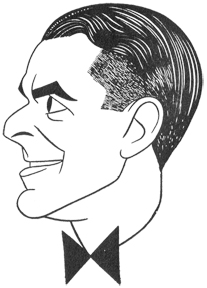In this chapter from his 1932 book, Times Square Tintypes, Broadway columnist Sidney Skolsky profiles George White, a theatrical producer who is perhaps not as well remembered today as the man who served as his primary competition in the 1920s and ’30s, Florenz Ziegfeld.
SCHOOL FOR SCANDAL
A HOODLUM was picked up on the streets of Toronto for raiding fruit stands. A stern judge saw that the law took care of him and said: “You’re a bad egg. No good will come rom you.” The bad egg was GEORGE WHITE.
Weighs 140 pounds. Has never been known to eat fast or walk slowly.
His father was a Jewish garment manufacturer on Delancey Street. There were ten other children in the family. He stole fruit, blacked boots, danced, sold flowers and papers. As a kid he had no great ambition.
Delights in playing practical jokes on his stars. Almost to the point of ruining their performance in his own show.
He has a patent-leather hair comb. Pays great attention to his hair. Always carries a bottle of petroleum oil which he alternates between rubbing on his hair and drinking.
His début as a dancer was made in “Piggy” Donovan’s saloon on the Bowery. He was then “Swifty,” the messenger boy. Was delivering telegrams when he asked the piano player to let him hoof. He collected 12.30 which was tossed at him. He threw away the remainder of the telegrams. Two were marked: “DEATH—RUSH.”
Is thirty-eight years old. The first thing he notices about a woman is her legs. Then her form. After that her face. Is on the credit side of the matrimonial ledger and never expects to get married.
He has a Jap butler, Shei, who gets tight on his best Scotch. He won’t fire him. He likes his cooking.
Once was kicked out of a saloon by a singing waiter named Irving Berlin.
Was a stable boy and a jockey. He followed the horses around the country. Later, his love for the races cost him $850,000 in eighteen months. Once dropped $100,000 on one race. Then he swore off. Hasn’t been at a race track for the past five years.
He was the vaudeville performer to do a dance on skis.
Generally gets to bed at about four in the morning and is up at twelve. Spends a part of each day playing with the mechanical toys he brings back from his yearly trips to Paris.
His hobby is selling tickets in the box office. Some day he hopes to be able to tell Ziegfeld there is “Standing Room Only.”
Does things on the spur of the moment. Five minutes before he sailed for Paris a year ago he purchased a Park Avenue apartment house. Merely because he liked one apartment in the building. He lives in an apartment on Seventh Avenue because he doesn’t want to pay the Park Avenue rent he charges.
His middle name is Alviel which he uses only on checks.
Among his major hates are first nights, paper napkins, barbers with a selling complex and crowds—except at his own shows.
He owns a Rolls-Royce which can be seen standing outside of his own theater. He generally walks home between the car tracks in Times Square. He won the auto on a bet. On first hearing “The Birth of the Blues,” he bet a music publisher a Rolls-Royce it would be a song hit. It was.
Produced and operated six annual editions of his Scandals, each doing an approximate gross business of $1,250,000 without an office. In those days his office was in his pocket.
In selecting chorus girls he generally allows Lew Brown to help him do the picking.
He hasn’t read a book for as long as he can remember. He never attends a performance of a dramatic play. He sees all the musicals.
Cried only once in his life. That was when he read Burns Mantle’s criticism of his first show which said: “The Scandals of 1919 prove that a hoofer should stick to his dancing.”
His sole exercise is a walk around the Reservoir in Central Park. On these occasions he takes along a male companion or a thin walking stick.
Always wears blue serge suits, black shoes, white silk shirts and black ties. One day he wore a gray suit and the stage doorman, failing to recognize him, wouldn’t let him in.
His favorite meal is one consisting of caviar and champagne. He can eat a pound of caviar at a sitting. Is a very slow eater. It takes him an hour to consume a sandwich.
Not so long ago a women, Rose Janousek, sent him a package containing a revolver and a few rounds of ammunition merely because she admired him.
On Sunday nights he generally takes his best girl to the Roxy. While looking at the picture they hold hands.
When his ego rises, he modestly enough calls Broadway—The Great White Way—believing it was named after him.


